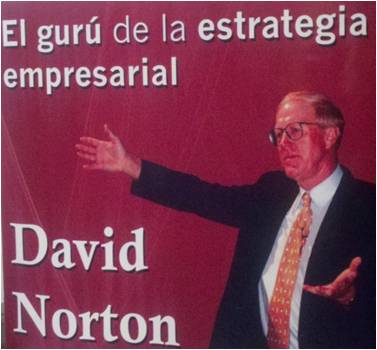
David Norton – El guru de la estrategia empresarial
I have worked closely with Dr. David Norton, co-creator of the Balanced Scorecard for more than twelve years. He has been championing the evolution of the Balanced Scorecard from a measurement concept to a management concept for the last twenty years. He speaks publicly more than once a month on the topic of the Balanced Scorecard. If you listened to him each presentation, you might think that he would get tired presenting the same material. But if you listen closely, you will see that the material evolves as the research evolves. I had the chance to listen to Dr. Norton this week in Mexico City, and listening closely, I was inspired during each presentation that the Balanced Scorecard concept is alive and well.

The guru of strategy execution spoke about all aspects of the Balanced Scorecard for 6 hours in Mexico City at an IRR presentation. I was there with our partner, Tantum. Earlier in the week, we had visited Tantum clients and prospects talking about the BSC and ClearPoint Strategy. Listening to real organizations talk about their strategic challenges and management systems is way more interesting than listening to a Guru talk conceptually about management, so I thought.
I was wrong this time. Dave gave a fantastic refresher of the Strategy Focused Organization principals. These principals were first written about in his book in 2000. Now, 11 years later, the material, research, and cases are all fresh and new, showing that the Balanced Scorecard is alive and well around the world. The principles, Dave argues, are seen in most organizations that are achieving breakthrough results with the Balanced Scorecard. They are, in summary, executive leadership, the Balanced Scorecard framework, organization alignment, individual alignment (strategic jobs and communications), and good governance.
I will write an individual post about each principle and some of the modern thinking on the topic. If you are considering the Balanced Scorecard, but are worried that the topic is over 20 years old, you should be comforted that the framework has thrived and evolved over the last twenty years, rather than grown stale and outdated.



June 2021
| S | M | T | W | T | F | S |
|---|---|---|---|---|---|---|
| 1 | 2 | 3 | 4 | 5 | ||
| 6 | 7 | 8 | 9 | 10 | 11 | 12 |
| 13 | 14 | 15 | 16 | 17 | 18 | 19 |
| 20 | 21 | 22 | 23 | 24 | 25 | 26 |
| 27 | 28 | 29 | 30 |
Monthly Archive
June 2014 (1)
May 2014 (2)
March 2014 (1)
February 2014 (2)
January 2014 (1)
December 2013 (1)
October 2013 (2)
September 2013 (1)
July 2013 (2)
June 2013 (2)
April 2013 (1)
March 2013 (3)
February 2013 (4)
January 2013 (7)
December 2012 (4)
November 2012 (8)
October 2012 (9)
September 2012 (5)
August 2012 (6)
July 2012 (5)
June 2012 (7)
May 2012 (8)
April 2012 (5)
March 2012 (5)
February 2012 (6)
January 2012 (6)
December 2011 (7)
November 2011 (9)
October 2011 (9)
September 2011 (2)
August 2011 (8)
July 2011 (6)
June 2011 (8)
May 2011 (12)
April 2011 (5)
March 2011 (1)
February 2011 (2)
January 2011 (4)
December 2010 (6)
November 2010 (3)
October 2010 (5)
September 2010 (4)
August 2010 (3)
July 2010 (2)
June 2010 (1)
May 2010 (2)
April 2010 (1)
March 2010 (3)
January 2010 (4)
December 2009 (1)
November 2009 (1)
October 2009 (1)
September 2009 (3)
August 2009 (2)
July 2009 (3)
June 2009 (3)
May 2009 (6)
April 2009 (5)
March 2009 (3)
February 2009 (2)
January 2009 (2)
December 2008 (2)
November 2008 (2)
October 2008 (4)
September 2008 (6)
August 2008 (5)
July 2008 (4)
June 2008 (9)
May 2008 (5)
April 2008 (6)
March 2008 (8)

